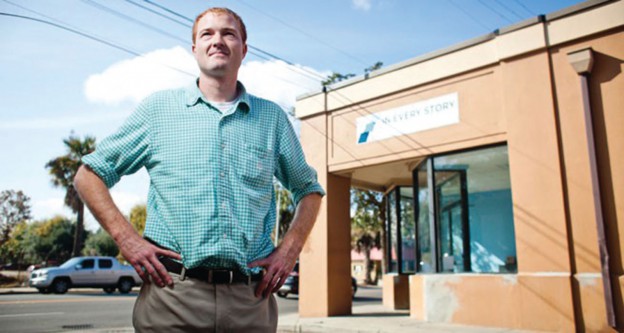
One year after graduating from Furman, Derek Snook, ‘08, voluntarily checked into Star Gospel Mission, a Charleston halfway house for the homeless. After spending several months in Africa following his graduation, he realized that there was a disconnect between the people who were fighting poverty and those actually living in it.
“The mission taught me while people may do confusing things, when you understand why they behave the way they behave you can see yourself in them,” Snook writes in his essay, “Understanding a Story.” Taking this to heart, Snook established a temporary labor agency in 2011 named In Every Story (IES).
As the company celebrates its fifth anniversary, Snook recognizes not just the progress that IES has made, but also how far the company still has to go in order to reach its end goal: a livable wage for day laborers.
During his time at Furman, Snook studied British and American Missionaries in the context of 19th and 20th century imperialism in India and East Africa. This rather specific academic passion inspired him to become an advocate for poverty-stricken people.
“I learned one thing from my history major, and that’s this: Whatever you put your identity in will determine the course of your life and every action you take,” Snook said.
One action that Snook took was the conscious decision to live on a wage of $8.00 an hour, the same wage his agency provides for day laborers. His personal struggles with living on just more than minimum wage has given him a unique platform to acknowledge and to address some of the struggles faced by temporary employees.
IES sends out day laborers each day to assist with jobs like construction and clean up. Though it is similar to many other temporary labor agencies, the company operates with specific beliefs in mind.
The employees at IES aim to communicate three main ideas with regards to each individual story of each individual employee: every great story has conflict, there will always be good reasons to avoid conflict, and great authors use conflict to make stories matter.
“In every story there’s conflict, but there’s also examples of love, hope and redemption,” Snook said. “It’s an acknowledgement that each of us is living a story and every story is different.”
Snook aims to be a shining example of those principles of love, hope and redemption for the temporary workers employed by his company. He hopes that potential investors and individual donors will see the company’s commitment to treating each worker as a human being, and gain enough funding to raise his workers’ hourly wages to at least $9.74, the amount found by MIT researchers to be the truly livable minimum wage of Charleston.